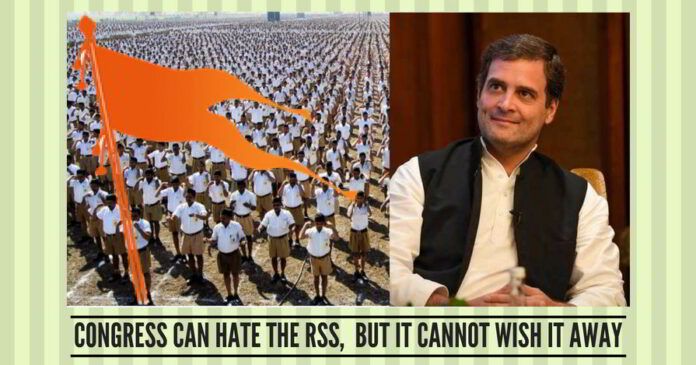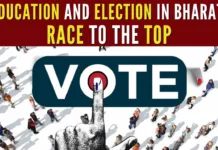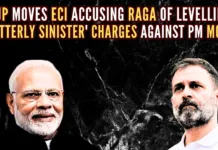
Various attempts have been made by Congress to contain RSS since independence, but nothing worked, RSS not just survived but also grew by leaps and bounds.
Until recently, critics of the RSS had offered many reasons for opposing the saffron organisation. The worst that had been said about it is that it was fascist in nature. Now, Rahul Gandhi has added a new dimension to justify his dislike of the outfit. At a recent event abroad, the Congress president compared the RSS to the terror group, Muslim Brotherhood. Some people may object to the Muslim Brotherhood being called a terrorist organisation, and point out that it had only years ago been in power in Egypt. But so had the Taliban in Afghanistan, and the Taliban is a terrorist body.
The Congress and other critics of the RSS indulged in polemics in the hope that they would be able to swing the conversation in their favour.
Going by Rahul Gandhi’s new wisdom, the RSS should be considered a terrorist outfit. And so, Pranab Mukherjee, a former President of the country and one-time senior Congress leader, recently participated in an event organised by a terror group! So had at one point in time, one of the country’s most respected pioneer-industrialists, JRD Tata. We needn’t mention the dozens of other eminent persons who accepted invitations of the RSS to attend their functions and learn something about the organisation.
The dislike, bordering on hatred, by the Congress, and the Left-liberals, is primarily because the RSS has successfully managed to offer an alternative narrative to those held by these elements. Earlier, the RSS had been doing so through its social outreach with the help of its many affiliates. With the rise of the Bharatiya Janata Party, the alternative narrative has seeped into the political sphere as well — with the Congress bearing the larger electoral brunt of the outcome.
Straightforward as these setbacks are, the Congress is unwilling to credit the RSS for them. Instead, it holds on to the belief that the organisation is a negative influence on the country’s social order, and that its prominence as a result of its success in misleading the public. Rahul Gandhi recently remarked that people want vision; when one organisation fails to give it, other steps in to fill the vacuum. In the decades following independence, the Congress increasingly lost its ability to offer a fresh vision to the people, and the latter drifted away to the Right — led by the RSS and its political arm, the BJP. The Congress and other critics of the RSS indulged in polemics in the hope that they would be able to swing the conversation in their favour. Since independence, attempts were also made by various Congress to contain the RSS through executive fiats. Nothing worked, and the RSS not just survived but also grew by leaps and bounds.
It’s amazing that the Congress should have failed to realise that every time it censored the RSS, the organisation gained more heft. It was banned in the wake of Mahatma Gandhi’s assassination. When the ban was lifted a year later, the outfit was none the worse for it; in fact, now it had a constitution which its critics could not condemn because it had been vetted by the Government in power then and that the constitution had been one of the conditions the Jawaharlal Nehru regime had imposed if the RSS wanted the ban to be lifted. It was next proscribed during the Emergency, and it came out with flying colours thereafter, given that the Emergency was seen as the closest that an event came to derailing democracy in the country and that it was not just the RSS but other critics of Indira Gandhi that were targeted. The third occasion it was banned was in the aftermath of the Babri mosque’s demolition in December 1992. That did not stop its rise; it may even have fuelled it further. According to available records, the number of its service projects (in the areas of health and education) shot up from 5,000 in 1989 to nearly 50,000 by 1998 — this was to reach 1,65,000 by 2012. Most objective analyses are unambiguous in their contention that the biggest growth of the RSS and its affiliates happened in the 1990s, more so after it was banned.
There is speculation that the RSS could extend an invitation to Rahul Gandhi for one of its forthcoming events.
While critics of the RSS have found many ‘reasons’ for their dislike, the one that is most quoted and flayed is the viewpoint of the organisation’s second chief and arguably the most prominent of those who led the saffron body since its inception some 90 years ago, MS Golwalkar. ‘Read the Bunch of Thoughts’, — a collection of Golwalkar’s writings, we are told, and it will be clear as daylight that the ‘RSS stands for divisiveness and hatred’. These rivals have over the years plucked statements from the collection, tore them away from the context in which they were made, and presented them as evidence of the RSS’s ideological position that renders non-Hindus as second-class citizens of the country.
Space is a constraint here to present a truer and more objective picture, and it is not the intention also, to offer to the readers a hagiographic account of Golwalkar. However, those who profess to have read the Bunch of Thoughts, must revisit the collection, if only to remind themselves that the RSS chief had spoken of ‘dynamic Hinduism’ and frowned upon ‘reactionary Hinduism’ — the latter, he explained, was the assertion of one’s Hindu faith merely because somebody from another faith had another take on the matter. Just one instance will suffice. He gives the example of the Hindu’s reactionary approach to the protection of the cow, and writes: “But (merely) since the Muslims are bent upon cow-slaughter, we should make this an issue.” Golwalkar called such people, Hindus not “out of conviction” but “out of reaction”.
Cut to the present — and there is speculation that the RSS could extend an invitation to Rahul Gandhi for one of its forthcoming events. If that happens, the Congress president will have to use his best diplomatic skills to manoeuvre the minefield. If he declines the invite, his decision will go against his repeated claim of tolerance to conflicting opinions and having nothing but “love” for his rivals. If he accepts, he will expose himself to criticism of entertaining the ‘fascist’ RSS.
Note:
1. The views expressed here are those of the author and do not necessarily represent or reflect the views of PGurus.











This author seems to enjoy a special status on this website. He quotes some figures about projects without any reference whereas most other articles give a list of references at the end.
Begs some questions. Does RSS publish numbers about its work and projects? If not, who or which entity does that?
Unless some clear pointers to data are included in the article, I would tend to ignore the conclusions based on those days.
Rahul Gandhis outburst against RSS reveals the hate hidden inside his heart. Congress has built its vote bank politics by projecting RSS as a monster. With elections looming no wonder this hate is displayed openly. It is sad that RSS remains an unappreciated organisation despite the wonderful work they have done in nation building. But public at large are more informed these days and the work done by RSS is heard and felt which is the reason why RSS is growing in a big way.
RSS has become a weapon for Rahul Gandhi to villify hindutva